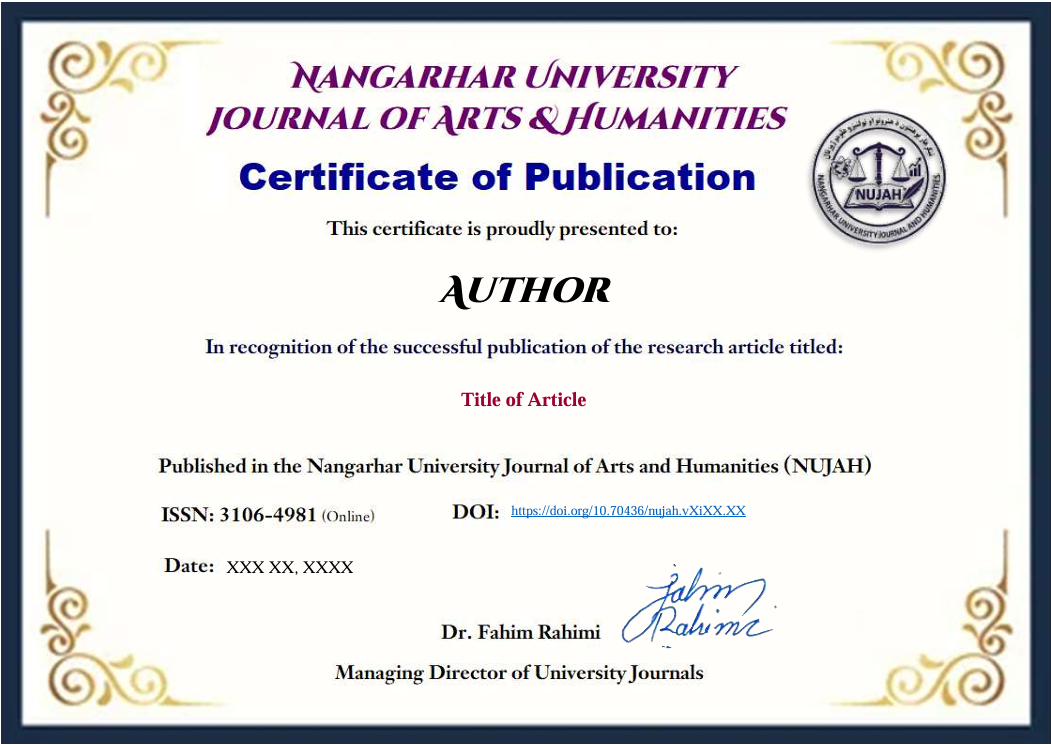English Language Shaping Social Behaviors of its Learners for better (NU Case Study)
DOI:
https://doi.org/10.70436/nujah.v1i01.10Keywords:
English Impact,, Social Behavior,, SLA,, Psycholinguistics,, SociolinguisticsAbstract
English has been acquired in Afghanistan included but not limited for educational and communicational purpose. Afghan students want to acquire knowledge and English can help them while Afghanistan as a nation is open to communication with outer world and English is so far the key medium. Even if English language has its social implication, English as a tool for cross-cultural communication plays a positive role and its learners and connecting Afghan people with the rest of the world. Research discovers that in many other countries, English learners are seen as more educated and thus firms and corporations prefer to hire them. Here, in terms of social behavior a language is considered as one of the most effective ways of determining a person’s behavior and interaction with others. The purpose of this article is to examine English language effects on students’ behavior and politeness. This paper examines how English language shapes personality and the emotional behavior of its learners in Afghanistan. Participants reported that English language make the more polite.
References
A Pavlenko, and Blackledge. "A Negotiation of Identities in Multilingual Contextsof Clevedon:." (2004).
https://doi.org/10.21832/9781853596483
Alfarhan, Ibrahim. "English as a Global Language and Effects on Culture and Identity." American Research Journal of English and Literature (2016): 1-6.
Appleby, D Barton. Y. Responding to People's lives. UK: NIAce and NRDC, 2008.
Barton, D, Ivanic, R, Appleby, Y, Hodge, R and Tusting, K. Literacy, Lives and Learning. Oxon: Routledge, 2007.
Coleman, H. "The English Language in Development." (2010). .
D, Gradol. English Next. London: British Council London, 2006. .
J, Dong. "Mobility, Voice and Symbolic Restratification: An Eethnogrpahy of 'elite migrants' in Urban China. Language and Superdivrsities ." 2012.
Khan, Waquar Ahmad. "YOUR LANGUAGE, YOUR IDENTITY: THE IMPACT OF CULTURAL IDENTITY IN TEACHING ENGLISH AS A FOREIGN LANGUAGE." European Journal of English Language Teaching (2020).
Nault, D. (2006). Going Global: Rethinking Culture Teaching in ELT Contexts. Language, Culture and Curriculum, 19(3), 314-328. https://doi.org/10.1080/07908310608668770
https://doi.org/10.1080/07908310608668770
Norton, B and Toohey, K. "Changing Perspectives on Good Language Learners." TESOL Quarterly (2001).
https://doi.org/10.2307/3587650
P, Chishwick. B. Lee Y and Miller. "Parents and Children Talk: English Language Proficiency within Immigrant Families. Review of Economics of the Household." 2005.
https://doi.org/10.1007/s11150-005-3457-z
Peacock, M. "Attribution and learning English as a foreign language. ELT Journal 64/2: 84-193." ELT Journal (2010): 64/2: 84-193.
https://doi.org/10.1093/elt/ccp031
Pennycook, A. Critical Applied Linguistics: A Critical Introduction. Mahwah NJ: Lawrence Erlbaum Associates, 2001.
Phillipson, RHL. Linguistic Imperialism. Oxford : Oxford University Press , 1992.
Schellekens, P. "English as a Barrier to Employment, Education and Training." (2001).
Y Golovatch, and R Vanderplank. "Unwitting Agents: the role of adult learners' attributions of success in shaping language-learning behaviour." Journal of Adult and Continuing Education (2007): 13/2 127 - 155.
https://doi.org/10.7227/JACE.13.2.3
Z, Dörnyei. "'The L2 Motivational Self System' in in Dörnyei, Z and Ushioda, E (eds) Motivation, Language Identity and the L2 Self. Bristol: Multilingual Matters." (2009): 9- 39.





